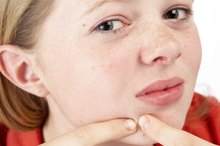What does fact checked mean?
At Healthfully, we strive to deliver objective content that is accurate and up-to-date. Our team periodically reviews articles in order to ensure content quality. The sources cited below consist of evidence from peer-reviewed journals, prominent medical organizations, academic associations, and government data.
- Mayo Clinic: Acne Symptoms
- Mayo Clinic: Common Wart Causes
- National Institutes of Health: Salicylic Acid Topical
The information contained on this site is for informational purposes only, and should not be used as a substitute for the advice of a professional health care provider. Please check with the appropriate physician regarding health questions and concerns. Although we strive to deliver accurate and up-to-date information, no guarantee to that effect is made.
Acne & Warts
Acne and warts are both common skin conditions that are easily recognizable because they are characterized by lesions or growths. Pimples and warts look very different and have different causes, although they may show up in some of the same body areas. They have some treatment similarities but they can also be handled in different ways.
Definition
The Mayo Clinic describes acne as a skin problem characterized by several types of pimples, including whiteheads, blackheads, nodules, cysts, pustules and papules 1.cause:
- The Mayo Clinic describes acne as a skin problem characterized by several types of pimples
- including whiteheads
- blackheads
- nodules
- cysts
- pustules
- papules 1
They grow when hair follicles (pores) get plugged up with natural skin oil and dead cells. They look like little red bumps or large lumps on the skin, depending on their severity, and some develop a head.
Location
How to Determine if a Face Blemish Is a Wart or Pimple
Learn More
Acne generally breaks out on the face, although it can appear anywhere the skin has hair follicles, according to the Mayo Clinic 1. Other common pimple sites include the neck, shoulders and back.
Warts most commonly grow on the hands and fingers or on the soles of the feet, where they are called plantar warts. They can appear on other parts of the body like the face, arms or legs and sometimes grow in the genital area.
- Acne generally breaks out on the face, although it can appear anywhere the skin has hair follicles, according to the Mayo Clinic 1.
- Warts most commonly grow on the hands and fingers or on the soles of the feet, where they are called plantar warts.
Causes
Acne is caused by pores that get clogged up with dead skin cells and excessive oil. The pores get inflamed, resulting in a pimple. Acne cannot be spread to other people and, contrary to popular belief, it is not affected by diet, the Mayo Clinic explains 1.
Wart growth is triggered by the human papillomavirus (HPV), which is contracted by contact with other person or an infected item like a towel or a surface like a pool deck, although the AAD states the risk is small. Genital warts are spread by intimate contact. The virus enters the body if it finds a break in the skin. Some people will not get warts even if they carry the virus, according to the Mayo Clinic, but others eventually get the little growths 1.
Neither acne nor warts are caused by bad hygiene, even though they are sometimes associated with being dirty.
- Acne is caused by pores that get clogged up with dead skin cells and excessive oil.
- Wart growth is triggered by the human papillomavirus (HPV), which is contracted by contact with other person or an infected item like a towel or a surface like a pool deck, although the AAD states the risk is small.
Effects
Vaginal Acne
Learn More
Untreated acne can lead to permanent scars, especially if it's cystic acne. Bad outbreaks may itch, and highly visible pimples can affect your self esteem. The AAD warns people with severe acne may withdraw socially, feel angry or frustrated and eventually become depressed.
Warts are usually painless, although plantar warts may hurt if walking puts pressure on them. They can affect self esteem if they are in a prominent area, but they have no lasting physical effects even if not treated. They eventually go away on their own, although they may last for months or years.
- Untreated acne can lead to permanent scars, especially if it's cystic acne.
- Warts are usually painless, although plantar warts may hurt if walking puts pressure on them.
Treatment
Both acne and warts are treated with over-the counter (OTC) products containing salicylic acid, according to the National Institutes of Health 4. It is generally applied to warts in liquid form to dissolve them, while it is used in cream, gel or lotion form for acne. It dries the skin, getting rid of oil, and promotes dead cell shedding.
Acne is also treated with OTC benzoyl peroxide remedies, while warts may be frozen off with do-it-yourself kits. Both conditions can also be treated by a doctor if they don't respond to home care. Dermatologists offer many options, including stronger topical remedies for both acne and warts, surgical or laser wart removal, and oral drugs or cortisone injections for acne.
- Both acne and warts are treated with over-the counter (OTC) products containing salicylic acid, according to the National Institutes of Health 4.
- Acne is also treated with OTC benzoyl peroxide remedies, while warts may be frozen off with do-it-yourself kits.
Related Articles
References
- Mayo Clinic: Acne Symptoms
- Mayo Clinic: Common Wart Causes
- Acne Net: Acne Can Change the Way You See the World
- National Institutes of Health: Salicylic Acid Topical
- Kraft J, Freiman A. Management of acne. CMAJ. 2011;183(7):E430-5. doi:10.1503/cmaj.090374
- Sutaria AH, Masood S, Schlessinger J. Acne Vulgaris. [Updated 2019 Dec 13]. In: StatPearls [Internet]. Treasure Island (FL): StatPearls Publishing; 2019 Jan-. Available from: https://www.ncbi.nlm.nih.gov/books/NBK459173/
- American Academy of Dermatology. WHAT CAN CLEAR SEVERE ACNE?
- Cleveland Clinic. Rosacea (Adult Acne). Last reviewed October 10, 2019.
- American Academy of Dermatology. IS SPORTS EQUIPMENT CAUSING YOUR ACNE?
- American Academy of Dermatology. I HAVE ACNE! IS IT OKAY TO WEAR MAKEUP?
- Zaenglein AL, Pathy AL, Schlosser BJ, Alikhan A, Baldwin HE, et. al. "Guidelines of Care for the Management of Acne Vulgaris." Journal of the American Academy of Dermatology; 2016. 74(5):945-73.
Writer Bio
Based in Kissimmee, Fla., Barb Nefer is a freelance writer with over 20 years of experience. She is a mental health counselor, finance coach and travel agency owner. Her work has appeared in such magazines as "The Writer" and "Grit" and she authored the book, "So You Want to Be a Counselor."









